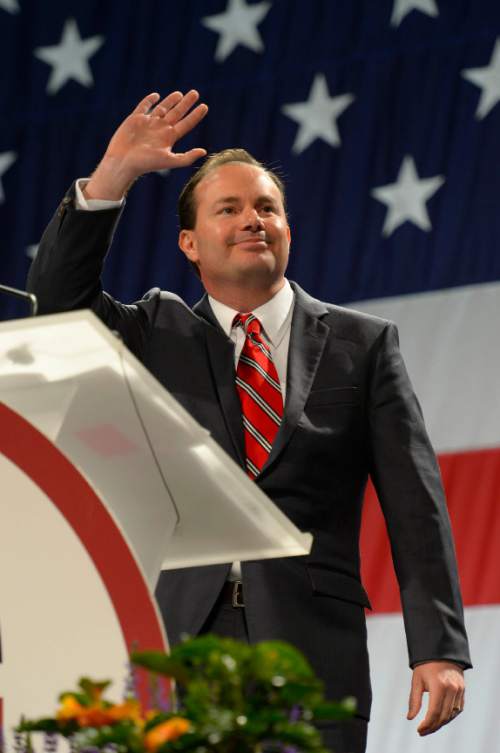This is an archived article that was published on sltrib.com in 2015, and information in the article may be outdated. It is provided only for personal research purposes and may not be reprinted.
Advocates for same-sex marriage may be winning the debate in America, but those who support only heterosexual unions still need to fight to protect themselves from government intrusion, Sen. Mike Lee, R-Utah, argued Thursday in calling for a movement to pass religious-liberty legislation in cities, states and Congress.
"This is a crucial point for those of us who work in capitals and county seats across the country," Lee said in Washington. "If the coming conversation about religious freedom is left to the judicial and executive branches of our government, all Americans — whether they know it or not — will lose that debate before it even begins."
Lee, a first-term Republican, says he will reintroduce legislation – dubbed the Government Non-Discrimination Act – that would protect religiously affiliated schools from mandates to recognize gay marriage and prevent any government agency from denying tax exemption, grants, contracts, accreditation, licenses or certifications based on a belief that marriage is between a man and a woman.
Lee introduced similar legislation in 2013, though it was never heard in committee.
"We cannot hide this issue under a bushel and hope no one asks us about it," Lee said at Hillsdale College's Kirby Center near the Senate. "We will have this debate. The only question is whether we start a conversation or we let the fundamentalists pick a fight."
He said fundamentalists are extremists of any political stripe who cannot abide points of view diverging from their own.
Gay-rights activists say what Lee proposes would be, essentially, a license to discriminate by those claiming the shield of religion.
Lee couched his pitch to push for legislation at all levels of government as continuing the American tradition of welcoming people of faith – and people of no faith – to follow their beliefs without "interference or regulation from the state" and added that the nation's "turn toward intolerance" comes from the campaign to legalize same-sex marriages.
"Like many Americans, I personally do not believe same-sex marriage is a constitutional requirement, or a federal prerogative, or even good policy for that matter," said Lee, who clerked for Samuel Alito before Alito's appointment to the U.S. Supreme Court. "But today, those of us who hold these views cannot deny that our arguments are no longer winning the public debate. Sometimes in a democracy, the other side wins."
That isn't to say, Lee noted, that if same-sex marriage is the law of the land that individuals and business who disagree with it should be forced to bake wedding cakes, cater or perform marriages for those who support such unions.
Troy Williams, executive director of Equality Utah, said most lesbian, gay, bisexual and transgender groups support protections for religious liberty and don't want to force churches to marry people who aren't their members. But he added that Lee's plan is "dangerous and it's misleading and a gross distortion" of what religious liberty is.
"Religious liberty does not give individuals license to freely discriminate against people who they believe are sinners," Williams said. "Senator Lee wants to allow individuals and businesses to put up a sign that says 'No Gays Served Here' and that's not the America any of us want to live in."
Williams pointed out that the Utah Legislature passed a law this year – with support from Republicans, Democrats, religious, gay and straight groups – that extended anti-discrimination protections for sexual orientation and gender identity. The law also clarified exemptions for religious institutions.
Lee, who is Mormon, also brought up his own faith, noting that the earliest followers of The Church of Jesus Christ of Latter-day Saints were persecuted as they moved across the country but that founder Joseph Smith responded by saying that if he couldn't persuade others to his way, he wouldn't compel them.
"As witnesses to that truth, in our pursuit of protecting religious liberty, we must proceed with resolve and conviction, and also with cheerfulness and charity," Lee added.



